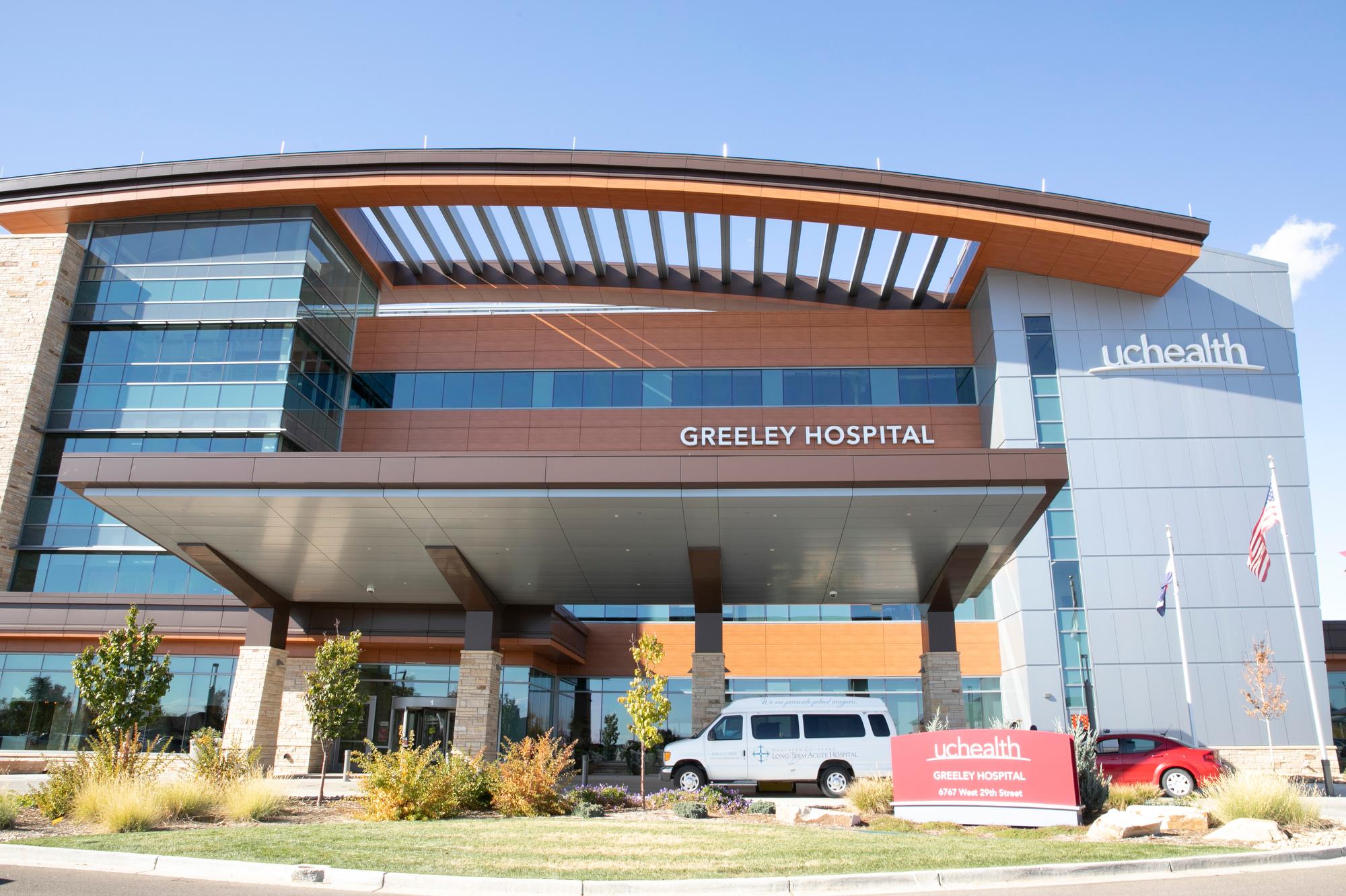
Cracks in Colorado’s hospital system are starting to appear, after weeks of dire warnings about the impact of back-to-back punches from the coronavirus, delivered by the delta and omicron variants during a time when health care workers are not only getting infected by but exhausted from nearly two full years of the pandemic.
Doctors and health experts are calling on the state to act, while hospitals are enacting their own policies to try to weather a wave of patients needing care from depleted emergency departments.
For instance, the UCHealth system adopted new rules in its emergency department last week about who will be admitted and what kind of care they receive. The rules are meant to ease pressure on the system and the staff by lowering the number of people who need acute care.
Despite the challenges, the state, hospitals and emergency physicians are united in urging Coloradans to seek, and not put off, emergency care if they need it.
To date, the Polis administration has not activated crisis standards of care for hospitals, far-reaching emergency protocols aimed to help them deal with the crisis. But just this week, emergency room physicians met with top leaders of the state’s pandemic response and the governor’s staff urging just that. The 700-strong Colorado chapter of The American College of Emergency Physicians followed that up with a letter to the governor’s office Friday that put the crisis in stark terms.
“As our health care system continues to struggle with multiple stressors on the system, we are at a breaking point,” the letter, written from talking points delivered to the governor’s office via Zoom call Tuesday, stated. “We are currently dealing with conditions that have never been seen before in our state.”
ERs doctors lay out serious issues
“We need your help ASAP!” the doctors wrote. Their first request to the governor's team was for better communication from the state about when to seek care in the ED for COVID-19 or other illnesses and injuries, where to seek care rather than testing and more information about seeking monoclonal antibody treatment. It also asked for more transparency on hospital reporting of staffed bed availability.
The group laid out a series of serious issues now plaguing the health care system: nursing shortages, a lack of access to rapid testing, significant liability risks for clinicians and hospitals now caring for patients, challenges in transferring patients statewide when hospitals are full and the anticipation, in coming weeks, of more patients coming to emergency departments to seek additional new oral medications to treat COVID-19.
Speaking in his capacity as the president of the Colorado chapter of The American College of Emergency Physicians, Dr Ricky Dhaliwal said “We are in a crisis. And the thing about it is that this is a crisis that's now, and it's about to get worse. The wait-and-see approach just I don't think is a smart way to do this.” Dhaliwal is also an emergency doctor at Sky Ridge Medical Center in Lone Tree.
Making matters worse, he said, is the numbers and proportion of health care workers getting sick with COVID-19, complicating hospitals’ ability to care for patients and presenting vexing problems for staffing.
“It’s all over the place. It’s droves of people getting COVID,” he said.
Dhaliwal said one concern state officials brought up was whether adopting statewide hospital crisis standards would create fear in patients of seeking emergency care.
The governor’s office hadn’t yet responded to a request for comment at the time of publication. A spokesman for the state health department said earlier Friday afternoon, the state had no plans and hoped to not have to activate hospital crisis standards of care.
Hospitals as busy as ever
The call from the ER doctors and UCHealth’s move comes as the omicron variant drives up high numbers of COVID-19 cases and a lot of people are seeking care for all kinds of other reasons as well.
“I don't want anybody to be dissuaded from seeking emergency care. That is not where we are. We are not in a position where we cannot care for people who have emergency medical conditions. We are well capable and well-staffed of doing that,” said Dr. Richard Zane, the director of emergency services at UCHealth. “The reason we're doing this is so we can continue to care for patients with emergency medical conditions.”
The move is critical, he said, in order for the system to be available for “the 22-year-old with the acute leukemia or the very sick COVID patient or the trauma patient, or the very sick myocardial infarction patient. We are essentially screening the low acuity patients who do not have emergencies and need an emergency department that day.”
He said if the University of Colorado Hospital emergency department in Aurora typically sees between 300 and 325 patients on an exceptionally busy day, now it’s seeing well over 400 patients per day. But it’s not just the number of patients that led the department to release new guidelines.
“We have much more volume, but contextually there's a staffing volume mismatch. I do not have staff to augment up to be able to care for over 400 patients per day,” he said.
Even so, that does not mean that people with medical emergencies are turned away. ERs are strained but are still able to treat emergencies like heart attacks, strokes or serious injuries.
Moving ahead with crisis care policies
“Every patient who has an emergency medical condition is going to get care. I think that's really important,” said spokesman Dan Weaver, UCH’s vice president for communications.
Zane said UCHealth emergency departments will be providing a medical screening exam for all patients upon arrival and if they don’t meet criteria for an emergency medical condition, they’ll be discharged with outpatient follow up recommendations.
“You can be seen by your primary care physician tomorrow, or get testing as an outpatient. So although it's not convenient news, it's good news,” he said.
It means simply that medical staff don’t consider you sick enough to need emergency care.
“In very high volume situations, those who are stable and who will not have negative health impacts if they are not admitted may be referred to other local care providers such as urgent care locations,” said Brian Spencer, a spokesman for the state’s Joint Information Center. “This ensures available emergency department resources are being used to best care for those presenting with emergent conditions.”
He said when somebody arrives at a hospital, hospitals must comply with federal rules about emergency medical care. That includes requirements to provide stabilizing treatment within the hospital’s capabilities and capacity before someone is transferred to another hospital, and to provide a medical screening examination to anyone who comes to the emergency department.
Similar guidelines about emergency department patients have been activated at University of Colorado Hospital in Aurora as well as some of the system's other facilities, including Highlands Ranch, Memorial Hospital in Colorado Springs, Memorial North, and for a brief period of time, Grandview Hospital.
“It's evaluated hour by hour by definition and essentially can be turned on or off,” said Zane. “We must maintain the ability to care for the high acuity tertiary kinds of patients that only we can care for. And that's a very important point for us.”
State hits 11,000 deaths due to COVID
Statewide, hospitalizations of confirmed COVID-19 patients rose to 1,663 Friday, according to the state dashboard. That's the highest level in more than a year and now within 200 away from the all-time pandemic peak of 1,847 in December 2020. At the current pace that peak could be surpassed in the coming days.
More than half of hospitals anticipate a staffing shortage in the next week and about a third say they expect to have a shortage of intensive care beds.
Ninety-one percent of the state's intensive care hospital beds are in use. That compares with 65 percent at the start of the pandemic in April 2020. As of Thursday, there were 135 available ICU beds out of the state’s total of 1,489.
On Friday, the state also surpassed another bleak milestone: 11,003 deaths due to COVID-19
“I am desperately worried about the hospital situation, even if 35 to 40 percent of the COVID cases are incidental,” said Tri-County Health Executive Director Dr. John Douglas, Jr., referring to patients who go to the hospital for other things like a heart attack, stroke or broken bone and get a positive COVID-19 test during routine testing at admission.
“I mean, you talk to anybody working in a hospital, and these are really tight times,” he said.
Other crisis standards of care have been activated
In recent weeks, one big hospital CEO said the system is on the brink of collapse. UCHealth’s chief nursing executive said she expected January to probably be the "scariest point" of the pandemic.
To cope with the ongoing challenges the system is facing, the state of Colorado in recent weeks activated crisis standards of care for hospital staffing and for emergency medical services — think ambulance and paramedic crews. But so far they haven’t been issued for hospital care.
“We do not plan to activate the crisis standards of care for hospitals and hope that we will not need to,” said Spencer.
He urged Coloradans to get vaccinated and stay up to date on their COVID-19 vaccine, and that anyone, regardless of vaccination status, who has symptoms should get tested immediately and isolate.
“It doesn't matter what we wanna call it. The number of patients, the number of available beds, the number of healthcare workers, there's a fundamental, basic math equation that doesn't work out right now,” said Dr. Anuj Mehta, a pulmonary care physician with Denver Health, who has worked on a team developing crisis standards and language for the state. “And the system is cracking under that pressure.”
Denver Health launched a virtual hospital from home a year ago. It was mostly focused on taking care of COVID-19 patients at home who perhaps needed oxygen and ongoing monitoring.
“We've expanded it,” Mehta said.
He said the program has improved its capacity, improved the monitoring of patients by nurses and doctors, while keeping people at home. Normally, these are people that “may come to the emergency department and we continue to care for them, but maybe we now have this alternate care pathway.”
Who is coming to ERs right now
Zane reiterated that change at UCHealth involves specifically how to deal with the least sick patients, a category he said makes up perhaps 20 percent of the ambulatory patients coming to emergency departments.
“It's the category of patients that you envision could have gone to urgent care, but happened to come to an emergency department. It's a category of patients that need an outpatient study, like an ultrasound, and couldn't get it for a time that was convenient for them,” he said.
Some come to the emergency department looking to get a test on that same day, but it's not required on that same day. It’s patients who've run out of their medications, but they're not critical medications. It's patients with upper respiratory infections that need no intervention.
The last time he worked a shift in the ED, Zane said, the department was having 20 to 25 patients per hour arrive for care.
“And when five to seven of those patients that present per hour are of low acuity, by being able to discharge them immediately after a medical screening exam and establishing that there's no emergency medical condition, that can allow us to care for the high acuity patients that otherwise may have had their care impacted,” he said.
Zane said coronavirus patient volumes in emergency departments, nationally, in Colorado and at UCHealth have increased “precipitously.”
Mehta said Denver Health is seeing similar trends, along with another which has taxed the system: Many people have come to emergency departments seeking COVID-19 tests, which have generally been in short supply outside of hospitals.
“There's no capacity for that,” in the emergency department he said, noting the system has added signs urging people to contact their primary care doctor or go to the state’s website.
The doctor’s group said it was hoping action by the state would help move the state’s hospitals and healthcare staff onto more firm footing.
“Morale is down. Physicians’ physical and mental health is being challenged,” said Suzanne Hamilton, CO ACEP’s executive director. “They're just really looking for some support.”
Editor's note: This story has been updated to clarify that Dr. Ricky Dhaliwal spoke to CPR News in his capacity as president of the Colorado chapter of The American College of Emergency Physicians and not on behalf of Sky Ridge Medical Center in Lone Tree.









